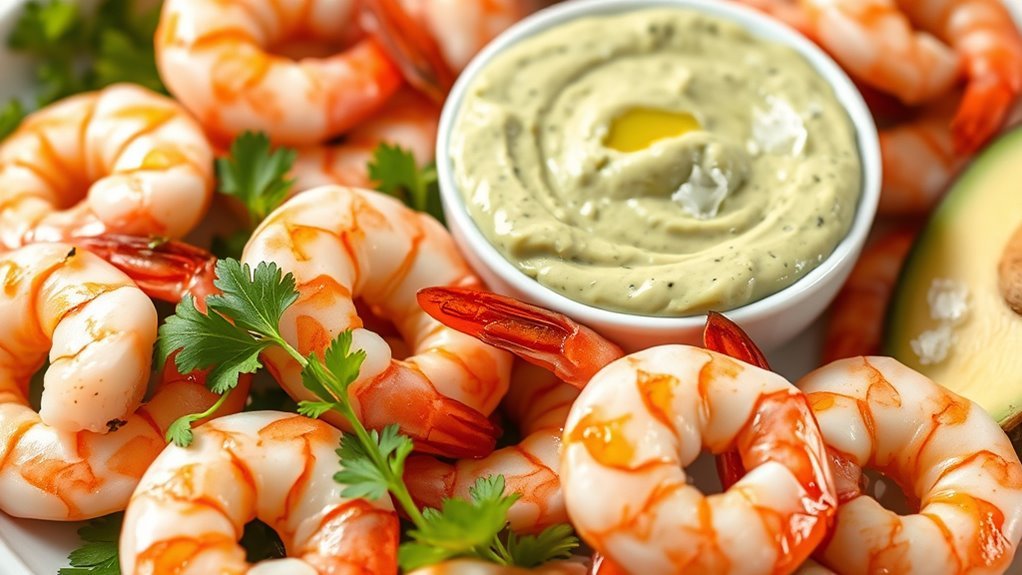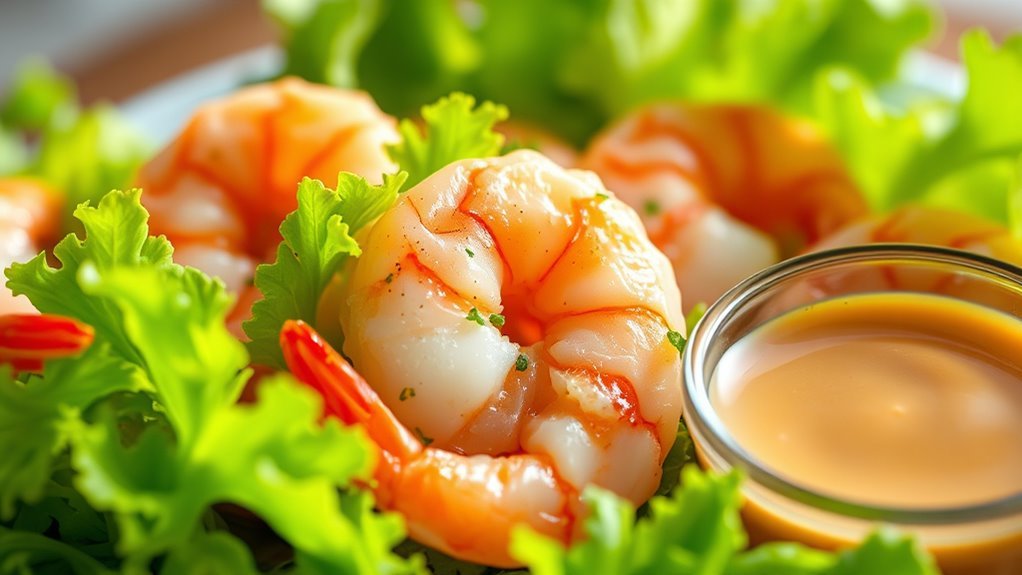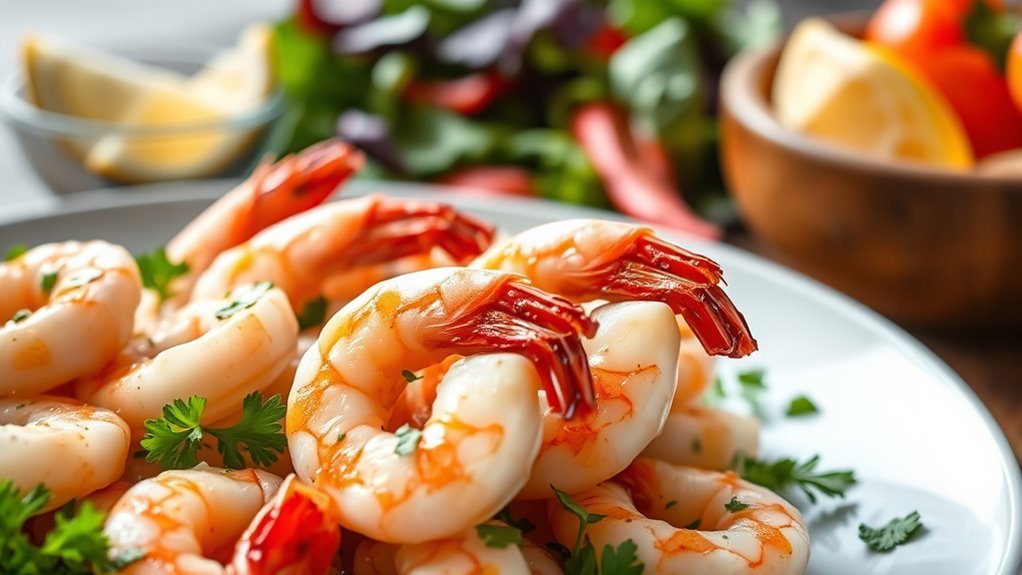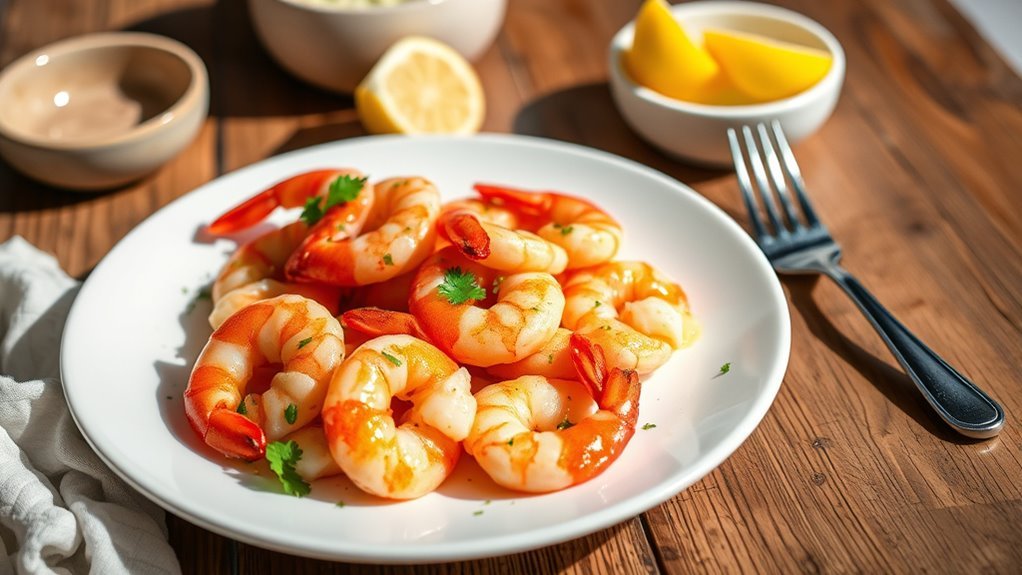Yes, shrimp is definitely keto-friendly! With only 1-2 grams of carbs per 3-ounce serving and about 20 grams of protein, it fits well into a low-carb diet. Plus, shrimp is low in calories and packed with essential nutrients like iodine and selenium. Just be cautious if you have shellfish allergies. If you want to explore tasty ways to incorporate shrimp into your keto meals, there’s plenty more to discover!
Nutritional Profile of Shrimp

When considering whether shrimp fits into a keto diet, it’s vital to examine its nutritional profile. Shrimp is low in carbohydrates, making it an excellent choice for keto enthusiasts. Most shrimp varieties contain about 1-2 grams of carbs per 3-ounce serving, while packing a protein punch of 20 grams. Additionally, shrimp is rich in essential nutrients like iodine and selenium, which support overall health. Oysters, like shrimp, are also low in carbohydrates, further emphasizing the variety of seafood options available for a keto diet.
When sourcing shrimp, opt for wild-caught or responsibly farmed options to guarantee quality and sustainability. The nutritional benefits can vary based on shrimp sourcing, so be mindful of where your seafood comes from. By choosing the right shrimp varieties, you can enjoy a versatile ingredient that aligns well with your keto lifestyle.
Benefits of Eating Shrimp on a Keto Diet

Eating shrimp on a keto diet offers several benefits that can help you maintain your goals. It’s low in carbohydrates, making it an excellent choice for keeping your carb intake in check, while also being high in protein to support muscle health. Additionally, shrimp is nutrient-dense, providing essential vitamins and minerals that can enhance your overall well-being.
Low in Carbohydrates
Since shrimp is incredibly low in carbohydrates, it’s an excellent choice for those following a ketogenic diet. With a minimal carb count, you can enjoy various shrimp varieties without worrying about exceeding your daily carb limit. Here’s a quick look at the carb content of some popular types:
| Shrimp Variety | Carb Count (per 100g) |
|---|---|
| Wild-Caught Shrimp | 0.9g |
| Farmed Shrimp | 1.0g |
| Black Tiger Shrimp | 1.1g |
High in Protein
Shrimp not only stands out for its low carbohydrate content but also shines as a rich source of protein, making it a fantastic addition to a ketogenic diet. With approximately 24 grams of protein per 100 grams, shrimp benefits those looking to maintain muscle mass while minimizing carbs. This lean protein source is low in calories and fat, allowing you to enjoy satisfying meals without derailing your keto goals. Incorporating shrimp into your diet can help keep you full and energized, making it easier to navigate your daily activities. Plus, with its versatility in cooking, shrimp can fit into various recipes, ensuring you don’t get bored. Embrace shrimp as a delicious way to meet your protein needs on keto! Additionally, shrimp is packed with essential nutrients like vitamin B12, which supports overall health and well-being.
Nutrient-Dense Seafood
Seafood, particularly shrimp, is a treasure trove of essential nutrients that can greatly enhance your keto diet. Not only is shrimp low in carbs, but it also offers a wealth of health benefits when you choose sustainably sourced varieties.
Consider these nutrient highlights:
- Omega-3 Fatty Acids: These healthy fats support heart health and reduce inflammation.
- Vitamins and Minerals: Shrimp is rich in B12, selenium, and iodine, crucial for energy and thyroid function.
- Variety of Options: From wild-caught to farmed shrimp varieties, you can enjoy diverse flavors and textures while sticking to your keto goals.
Incorporating shrimp into your meals not only satisfies your cravings but also fuels your body with nutrient-dense goodness, as it is low in carbs and provides healthy fats that are beneficial for a ketogenic lifestyle.
How to Incorporate Shrimp Into Your Keto Meals

When you’re looking to elevate your keto meals, incorporating shrimp can be a delicious and versatile option. You can easily whip up shrimp tacos by using lettuce wraps instead of tortillas, adding avocado, and drizzling with a low-carb sauce. For a revitalizing dish, try a shrimp salad loaded with leafy greens, cherry tomatoes, and a zesty vinaigrette. These meals not only fit your keto lifestyle but also provide essential nutrients and healthy fats. Don’t hesitate to experiment with spices and herbs to enhance the flavors. With shrimp as your protein source, you’ll enjoy satisfying, low-carb dishes that keep your meals exciting and flavorful, ensuring you stay committed to your keto journey. Additionally, low-carb vegetables can be a great pairing with shrimp, enhancing the overall nutritional profile of your meal.
Cooking Methods for Keto-Friendly Shrimp Dishes
When cooking shrimp for a keto diet, you’ll want to focus on methods that enhance flavor without adding unnecessary carbs. Grilling gives shrimp a smoky taste, while sautéing with healthy oils keeps the dish light yet satisfying. Baking with flavorful spices can also elevate your meal, ensuring you enjoy every bite without straying from your keto goals.
Grilling Shrimp Perfectly
Grilling shrimp can elevate your keto-friendly meals with a burst of flavor and texture. To get the most out of your shrimp, try these grilling techniques:
- Marinate your shrimp in a mix of olive oil, garlic, and herbs for a zesty kick.
- Skewer shrimp with colorful bell peppers and zucchini for a vibrant presentation.
- Season with a sprinkle of smoked paprika or chili flakes to enhance the natural sweetness.
These flavor pairings not only complement the shrimp but also keep your meals exciting and satisfying on a keto diet. Additionally, shrimp are low in carbs, making them a perfect protein choice for keto diets. Whether you’re hosting a barbecue or enjoying a simple weeknight dinner, mastering grilling shrimp will add variety to your culinary repertoire while keeping it deliciously low-carb. Enjoy!
Sautéing With Healthy Oils
After perfecting your grilling technique, sautéing shrimp offers another fantastic way to prepare this keto-friendly protein while adding rich flavors. When you sauté, you can enhance the shrimp’s taste with various ingredients while keeping it healthy. Opt for healthy oils like olive oil, avocado oil, or coconut oil, which fit nicely into a keto diet. These oils not only provide beneficial fats but also withstand higher cooking temperatures.
Utilizing proper sautéing techniques, like cooking over medium heat and stirring frequently, helps achieve that perfect, tender texture without overcooking. Pair your sautéed shrimp with low-carb veggies or a fresh salad for a satisfying meal. Embrace this flavorful method to enjoy a delicious, keto-friendly shrimp dish that aligns with your dietary freedom. Additionally, incorporating healthy fats into your meals can further support your ketogenic lifestyle.
Baking With Flavorful Spices
Although baking shrimp may seem straightforward, incorporating flavorful spices can elevate the dish while keeping it keto-friendly. By using creative spice combinations, you can add depth and excitement to your meal without adding unnecessary carbs. Here are some delicious options to think about:
- Garlic and paprika: A classic combo that brings warmth and richness.
- Cajun seasoning: Adds a zesty kick, perfect for those who enjoy a little heat.
- Lemon zest and dill: A revitalizing mix that brightens up the shrimp’s natural flavor.
These flavor enhancements not only make your shrimp more enjoyable but also help you stay on track with your keto lifestyle. So, don’t hesitate to experiment with spices—your taste buds will thank you!
Potential Allergies and Considerations
When considering shrimp as part of a keto diet, it’s important to be aware of potential allergies and individual health considerations. Shellfish allergies are quite common and can lead to serious reactions in sensitive individuals. If you’ve had a previous allergic reaction to shrimp or any other shellfish, it’s best to avoid it altogether. Additionally, some people may experience shrimp sensitivity, which can manifest as digestive issues or skin reactions even without a full-blown allergy. Always listen to your body and consult with a healthcare professional if you’re unsure about introducing shrimp into your diet. Prioritizing your health allows you the freedom to enjoy your food choices while staying safe.
Shrimp vs. Other Seafood Options
If you’re considering seafood for your keto diet, shrimp is just one of many options available. When making seafood comparisons, it’s essential to evaluate different shrimp types alongside other seafood to find what fits best in your meal plan.
- Salmon: Rich in omega-3s and healthy fats, it’s a great choice for keto enthusiasts.
- Mackerel: Another fatty fish, low in carbs and high in protein, providing a hearty option.
- Scallops: Delicate and slightly sweet, they’re low-calorie but can be higher in carbs than shrimp.
Each of these options offers unique nutritional benefits, so explore and enjoy the variety while maintaining your keto lifestyle! Additionally, incorporating whole, unprocessed foods can enhance your overall health on the keto diet.
Meal Prep Ideas Featuring Shrimp
Since shrimp is not only low in carbs but also packed with protein, it makes for an excellent ingredient in meal prep. You can whip up shrimp tacos using lettuce wraps for a fresh, crunchy option. For lunch, try a shrimp salad with mixed greens, avocado, and a tangy dressing. If you’re in the mood for something warm, a quick shrimp stir fry with colorful veggies is both nutritious and filling. For grilling, shrimp skewers marinated in your favorite spices can be a delightful dinner choice. Craving comfort food? Shrimp curry is rich and satisfying, while shrimp pasta made with zucchini noodles offers a low-carb twist. These ideas keep your meals exciting and aligned with your keto lifestyle.
Common Mistakes to Avoid When Eating Shrimp on Keto
While shrimp is a fantastic protein source for your keto diet, there are some common mistakes you should avoid to fully reap its benefits.
Shrimp is a great protein option for your keto diet, but avoid common pitfalls to maximize its benefits.
Here are a few key points to keep in mind:
- Shrimp Preparation: Overcooking shrimp can lead to a rubbery texture. Aim for a delicate sauté or grilling to retain flavor and nutrients.
- Portion Control: It’s easy to lose track of how much shrimp you’re eating. Stick to recommended serving sizes to maintain your macros.
- Sauces and Sides: Be cautious with high-carb sauces or sides. Opt for keto-friendly options to guarantee you stay within your carb limits.
- Balancing Carbohydrate Content: Consider combining shrimp with high-fat foods to help balance carbohydrate content while enjoying your meals.
Frequently Asked Questions
Can I Eat Shrimp Raw on a Keto Diet?
You can eat raw shrimp on a keto diet, but you need to be cautious about raw shrimp safety. Did you know that nearly 80% of seafood-borne illnesses come from raw or undercooked seafood? To enjoy shrimp safely, consider using it in keto shrimp recipes that involve cooking. This way, you’ll minimize health risks while savoring delicious, low-carb meals. Always verify shrimp is fresh and sourced from reputable suppliers. Enjoy your keto journey!
Is Shrimp Sustainable and Eco-Friendly?
Yes, shrimp can be sustainable and eco-friendly, but it depends on where it’s sourced from. You should look for shrimp that’s certified by organizations promoting sustainable fishing and eco-friendly practices. Wild-caught shrimp from well-managed fisheries tend to have a lower environmental impact compared to certain farmed options. Always check labels and ask questions to guarantee you’re making choices that align with your values for a healthier planet.
How Does Shrimp Affect Cholesterol Levels?
Shrimp can actually be beneficial for your cholesterol levels. While cholesterol myths suggest that shrimp’s high cholesterol content is harmful, research shows it may not greatly impact your blood cholesterol. Instead, shrimp is low in saturated fat and rich in omega-3 fatty acids, which can promote heart health. So, if you enjoy shrimp, you can include it in moderation while reaping its benefits without worrying too much about cholesterol levels.
Can Shrimp Cause Digestive Issues for Some People?
Absolutely, shrimp can cause digestive issues for some people. If you’re allergic to shrimp, it can trigger not just allergic reactions but also gastrointestinal distress. Your body might lack the necessary digestive enzymes to break down shrimp properly, leading to discomfort. It’s important to listen to your body; if you experience bloating or nausea after eating shrimp, you might want to steer clear. Freedom means knowing what works for you, after all!
What Are the Best Shrimp Brands for Keto?
When it comes to the best shrimp brands for keto, look for wild-caught options like Pacific or Gulf shrimp. These are often fresher and contain fewer additives. Brands like SeaPak and Wild Caught offer great choices. You can whip up delicious shrimp recipes like garlic butter shrimp or shrimp stir-fry, keeping your meals low-carb and flavorful. Always check for quality and sustainability to guarantee you’re making a healthy choice. Enjoy!
References
- https://www.healthline.com/nutrition/shrimp-keto
- https://www.dietdoctor.com/low-carb/shrimp
- https://www.ncbi.nlm.nih.gov/pmc/articles/PMC6510397/
- https://www.thespruceeats.com/health-benefits-of-shrimp-4813418
- https://www.ketogenic.com/what-is-keto-friendly-food/
- https://www.verywellfit.com/are-shrimp-keto-friendly-5182860
- https://www.medicalnewstoday.com/articles/323578
- https://www.cdc.gov/nutrition/healthy-eating/what-is-keto.html


